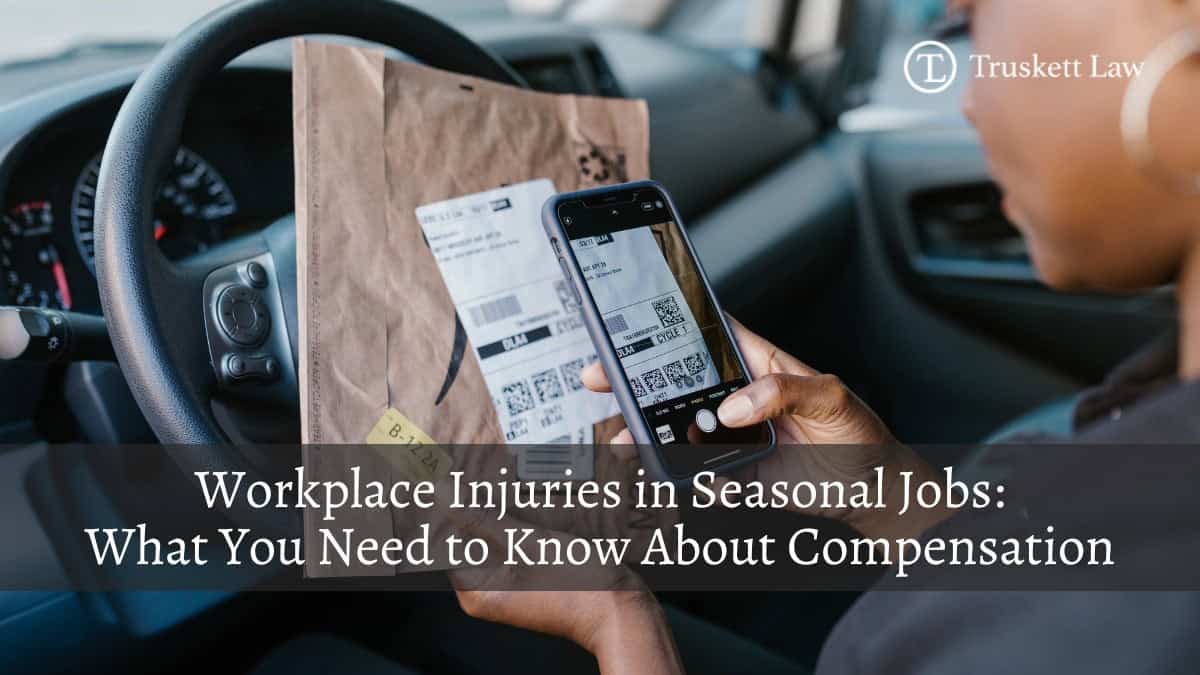
10 Nov Workplace Injuries in Seasonal Jobs: What You Need to Know About Compensation
Seasonal employment offers opportunities for students, retirees, and temporary workers to earn extra income, gain experience, and stay active during peak business periods. From summer amusement parks and holiday retail to agricultural work and delivery services, seasonal jobs are a vital part of the economy. However, while these positions can be rewarding, they often come with unique workplace risks.
Fast-paced environments, temporary training, and high turnover can increase the likelihood of accidents and injuries. Understanding your rights, knowing what to do if an injury occurs, and seeking proper legal guidance can make a significant difference in protecting your health and financial future.
Common Risks in Seasonal Employment
Seasonal jobs can vary widely, but several hazards are common across industries. In retail and food service, workers may slip on wet floors, sustain cuts from kitchen equipment, or suffer repetitive stress injuries from stocking and handling merchandise.
In outdoor or agricultural work, employees face risks such as heat exhaustion, falls, machinery accidents, and exposure to pesticides or other chemicals. Delivery drivers and warehouse staff often contend with long hours, heavy lifting, and vehicular accidents.
High turnover and temporary staffing can compound risks, as new employees may receive limited training or supervision. Employers may prioritize speed over safety during busy periods, which can lead to unsafe working conditions. Awareness of these risks and preventive measures is crucial for both employees and employers.

Understanding Workplace Injury Compensation
Workers’ compensation is the primary method of providing financial support for employees injured on the job. These benefits typically cover:
- Medical expenses related to the injury, including hospitalization, surgery, and rehabilitation.
- Lost wages if the injury prevents you from working temporarily or permanently.
- Disability benefits in cases of permanent impairment.
- Vocational rehabilitation if your injury affects your ability to return to your previous job.
Even in seasonal employment, workers are generally entitled to these benefits, provided the injury occurred while performing job-related duties. State laws vary, so understanding the specific requirements in your area is essential.
Reporting Your Injury Promptly
Timely reporting is a critical step in securing workers’ compensation benefits. Notify your supervisor or employer immediately after an injury, even if it seems minor. Many states require that workplace injuries be reported within a specific timeframe, and failing to report promptly can jeopardize your claim.
Keep detailed records of the incident, including the date, time, location, and circumstances. If there were witnesses, collect their names and contact information. Documentation strengthens your claim and provides a clear record for insurance adjusters and legal counsel.
Medical Attention and Documentation
Seeking immediate medical care is not only important for your health but also for your compensation claim. Even minor injuries can escalate if left untreated, and medical records serve as critical evidence of the injury and its connection to your work.
Be sure to follow your doctor’s treatment plan, attend all appointments, and retain copies of medical reports, bills, and receipts. Document any ongoing symptoms or limitations in your daily activities, as this information can affect your compensation and future work prospects.
Challenges Unique to Seasonal Workers
Seasonal employees may face particular challenges when filing claims. Some seasonal positions are temporary or part-time, and workers may assume they are not eligible for full benefits. Misunderstandings about eligibility can lead to delayed claims or denied compensation.
Additionally, temporary staffing agencies or subcontractors often complicate liability. If you were hired through an agency or third-party contractor, determining the responsible employer can be complex. In these cases, legal guidance can help clarify which entity is liable and ensure your claim is processed correctly.
Common Mistakes That Can Jeopardize Your Claim
Several common errors can reduce the chances of receiving fair compensation:
- Failing to report the injury promptly to your employer.
- Not seeking medical attention immediately.
- Downplaying symptoms or returning to work too soon.
- Accepting a quick settlement from the employer or insurance company without legal consultation.
- Neglecting to document the circumstances and impact of the injury.
Avoiding these mistakes helps protect your right to full compensation and prevents disputes with insurance companies.
Workers’ Compensation vs. Personal Injury Claims
In many workplace injury cases, workers’ compensation is the exclusive remedy for employees, meaning you cannot sue your employer directly for negligence. However, there are exceptions. If a third party – such as a contractor, equipment manufacturer, or another employee – contributed to your injury, you may have grounds for a separate personal injury claim.
For example, if faulty machinery causes an accident, you could pursue compensation from the manufacturer. Similarly, if a delivery driver working for a third-party company injures you while on a seasonal assignment, liability may extend beyond your immediate employer. A lawyer can help identify all responsible parties and ensure you pursue the full range of potential compensation.

How a Lawyer Can Assist Seasonal Workers
Consulting a personal injury lawyer can make a significant difference, especially in complex seasonal employment cases. An attorney can:
- Investigate the circumstances of the accident.
- Determine which employer, agency, or third party is legally responsible.
- Handle communications with insurance companies.
- Ensure all medical documentation and evidence are properly submitted.
- Negotiate fair compensation or pursue litigation if necessary.
Legal guidance is particularly valuable when claims are disputed, delayed, or denied, as it can help protect your rights and maximize your recovery.
Safety Tips for Seasonal Employees
Prevention is always better than recovery. Seasonal workers can reduce the risk of injury by:
- Attending all safety trainings provided by the employer.
- Wearing appropriate personal protective equipment (PPE) for the job.
- Following proper lifting techniques and ergonomics.
- Reporting unsafe conditions immediately.
- Avoiding rushing or cutting corners, even during busy periods.
Employers also have a responsibility to provide a safe working environment, and proactive communication between staff and management can prevent accidents.
Dealing With Insurance Companies
Insurance companies may attempt to minimize payouts, especially for temporary or seasonal employees. Adjusters might question whether the injury occurred during work hours or suggest the employee contributed to the accident.
A lawyer can help navigate these interactions, ensuring that statements are accurate and that the insurer does not exploit technicalities to reduce compensation. Proper documentation, medical records, and legal representation significantly strengthen your position.
Statute of Limitations and Deadlines
Each state sets a statute of limitations for filing workers’ compensation or personal injury claims. Missing these deadlines can prevent you from recovering benefits altogether.
Seasonal workers, especially those who leave employment after a short period, must be aware of these timeframes and act quickly to secure legal counsel. A lawyer can ensure that your claim is filed on time and in compliance with all relevant laws.
Returning to Work After an Injury
If you plan to return to work after an injury, it is important to follow medical advice carefully. Rushing back too soon can worsen your condition or lead to reinjury. Employers may need to provide modified duties or reasonable accommodations, depending on the severity of your injury and state regulations.
Document all communications with your employer regarding your ability to return to work and any accommodations provided. This documentation may be necessary for workers’ compensation claims or potential disputes.
Long-Term Considerations for Seasonal Job Injuries
Some seasonal injuries have long-lasting effects, including chronic pain, limited mobility, or permanent disability. Compensation should reflect not only immediate medical bills but also future medical needs, ongoing rehabilitation, and potential loss of income.
A lawyer can help assess long-term impacts and calculate appropriate compensation to ensure your recovery is fully supported. Even if the job was temporary, the consequences of an injury can extend far beyond the employment period.
Take Action With Confidence At Truskett Law
Seasonal work can be rewarding, but injuries happen, and when they do, knowing your rights and options is essential. At Truskett Law, we help seasonal employees navigate the complex process of workers’ compensation and personal injury claims. Our team investigates accidents thoroughly, communicates with insurers, and ensures that you receive fair compensation for medical expenses, lost wages, and long-term impacts.
Don’t let a workplace injury derail your life or finances. Contact Truskett Law today to schedule a consultation and take the first step toward protecting your rights and securing the recovery you deserve. With professional guidance, you can focus on healing while we handle the legal complexities.


Sorry, the comment form is closed at this time.